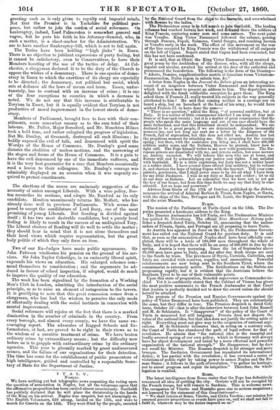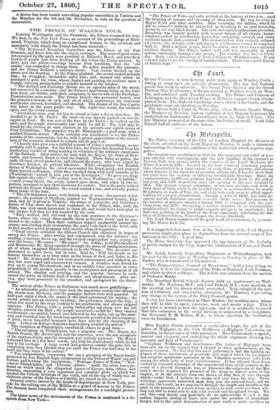IT AI.Y.
NABLES.
• We have nothing yet but telegraphic news respecting the voting upon the question of annexation in Naples, but all the teleerams agree that the affirmative proposition has been carried almost unanimously. Garibaldi has publicly declared that he will place the dictatorship in the hands of the King on his arrival. Naples was unquiet, but not alarmingly so. The English Volunteers, 650 strong, landed on the 15th, and were to march for Caserta on the 16th. They were feted by the people, escorted
4 by the National Guard from the ships to the barracks, and overwhelmed with flowers by the ladies. by the National Guard from the ships to the barracks, and overwhelmed with flowers by the ladies.
The Piedmontese army is in full march to join Garibaldi. The leading
columns had reached Isernia last week, and defeated there the soldiers of King Francis, capturing many men and some cannon. The next point was Venafro. King Victor Emmanuel followed the column, passing through Pescara, Popoli, Salmons, Castel Sangro, and reaching Iaerma or Venafro early in the week. The effect of this movement on the rear of the line occupied by King Francis was the withdrawal of all outposts on the left of Capua. Report stated that Capua had been evacuated, but this has not been confirmed.
It is said, that at Chieti the King Victor Emmanuel was received in great pomp by the Archbishop of the diocese, who, with all the clergy, regular and secular, awaited his arrival at the door of the cathedral and pronounced the benediction. The following is the form of the blessing- ' Adesto, Domine, supplicationibus nostais et famulum tuum Victorium- Emmanuelem, Item regem in salutis tum, &c." A letter from Naples in the Journal dee Debate gives an interesting ac- count of an intwview between Victor Emmanuel and the deputation which had beeniient to present an address to him. The deputation war delighted with the frank solclierlike reception he gave them. The King asked them if Francis II. really treated his subjects in the way generally attributed to him ? He said that coming neither in a carriage nor on board a ship, but on horseback at the head of his army, he would have wished Francis IL to have done the same-
" There is no question," added the King, "of personal ambition, but of Italy. It is a matter of little consequence whether I am king of four mil- lions or of four-and-twenty ; but it is a matter of great consequence that the people who speak the same language and are of one race should have the same fatherland, and that this fatherland should be independent. We are destined to be a great people, if we are determined. Austria incessantly menaces 'me, and not long sot) sent me a letter by the Emperor of the French, full of reproaches, but this does not affect me. Austria has lost the propitious moment for attacking me. She is preparing for the coming spring ; but then, with the assistance you bring me, I shall have 400,000 soldiers under arms, and the Italians, Heaven be praised, know how to fight still. The Pope himself writes to me now with gentleness. The Eu- ropean powers are dissatisfied with me, and remain sullen, but none menace us, Austria excepted. We will behave like men who are at home, and Europe will end by acknowledging our justice and rights. I am satisfied with Garibaldi. He is a little capricious, but Italy has not a nobler heart or a nobler child. I have several times offered him artillery, but he refuses it, and eherises the hope of taking Capua with the bayonet. Tell your com- patriots, gentlemen, that I shall never cease to be for all what I have been for my little Piedmont. I will do my duty as King and soldier ; let us all do our duty as Italians. Let us remember that we have not as yet got the key of our house, but from this time forth we may say that Italy is con- stituted. Let us hope and persevere." Advices from Gaeta of the 17th of October, published in the Debater announce the arrival of Admiral Barbier de Tinan, from Naples, at Gaeta, with the ships of the line, Bretagne and St. Louis, the frigate Descartes, and the aviso Mouette.
Tenor.
The session of the Parliament at Turin closed on the 15th. The De- puties presented a handsome address to the King
The Russian Ambassador has left Turin' and the Piedmontese Minister has quitted St. Petersburg. The official Noce Munehener Zeitung pub- lishes u despatch dated Turin, October 21, announcing that the ambas- sadors of Prussia Spain, and Portugal are all preparing to leave Turin.
As Austria has appeared in force on the Po, the Piedmontese Govern- ment has called out the National Guard for garrison duty. It is said that, as soon as the annexation of Naples shall have been officially com- pleted, there will be a levee of 100,000 men throughout the whole of Italy, and it is hoped that there will be an army of 300,000 in line by the spring. Austria is very menacing. Since the 1st of September above 50,000 men have gone to Italy, and day after day fresh troops are sent to the South by train. The provinces of Styria, Carniola, Carinthia, and Istria are crowded with reserves, supplies, and ammunition. • Powerful reinforcements are now being sent to the Southern Tyrol, where the commissariat is extremely active. The fortifications on the Stelvio are progressing rapidly, but it is evident that the Austrians believe the Southern Tyrol to be one of their vulnerable points. Upon this state of preparation, Benedek supervenes as Commander-in- chief. Yet it is confidently stated that the Cabinet of Vienna has given the most positive assurances to the French Ambassador at that Court that Austria is perfectly decided not to draw the sword unless she should herself be attacked.
The protests of the Prussian and Russian Governments against the policy of Victor Emmanuel have been published. They are substantially the same but they differ in tone. The Prussian despatch is dated Cob- lentz, October 13—that is after the interview between Lord John Russell and M. de Sehleinitz. It " disapproves " of the policy of the Court of Turin in measured but still language. Prussia does not dispute the value of the national idea, but that idea does not justify the setting aside of right. Everything must not give way to the exigencies of national aspi- rations. M. de Schleinitz intimates that, in acting on a contrary rule, the Court of Turin has abandoned the path of legal reform for that of revolution. He admits that "the national idea is the essential and loudly-avowed spring qf our own policy, which in Germany will always have for object development and union by a more effectual and powerful organization of the national strength." • He disapproves; but he does not recall his Minister. The Russian despatch is far stronger and:more brusque. The Sardinian Government has repudiated its international duties ; it has pactise with the revolution; it has crowned a series of violations of public right by taking power to annex Naples and the Ro- man States ; it follows in the path of revolution, "to gather its heritage, not to arrest progress and repair its iniquities." Therefore, the whole
legation is recalled. ,
Rom The latest intelligence from Rome states that the Pope has definitively renounced all idea of quitting the city. Orvieto will not be occupied by the French troops, but will remain to Sardinia. This is welcome news. The occupation of 'Viterbo and Montalto gave rise to serious suspicions; not lessened by the statement of this CVnetitutionnel- " We shall remain at Rome, Viterbo, and Civita Vecchia ; our mission bait assumed greater proportions as events have gore on, and we shall not fail to fulfil it, whatever may be the duties imposed on us."
A decree has been issued convoking popular assemblies in Umbria and the Marches for the 4th and 5th November, to vote on the question of annexation.



























 Previous page
Previous page